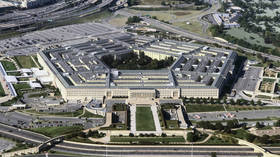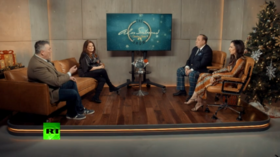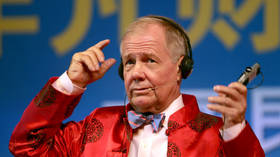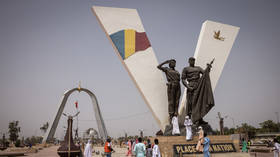Thirty years on, I miss the ‘Evil Empire’
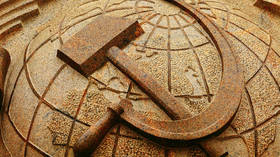
As a child of the Cold War, I grew up only knowing the Soviet Union as our enemy. When it collapsed, it created a vacuum when it came to defending the US. It turns out we needed the USSR to bring purpose to our own existence.
I was a child of the Cold War. The year that I was born, 1961, saw the Berlin Wall go up. When I was almost a year and a half old, the Cuban Missile Crisis had my parents wondering if there would be a tomorrow (we lived in central Florida at the time.) My father was an Air Force officer. In 1964, he was deployed to Turkey, where he maintained F-100 Suer Sabre fighter bombers standing strip alert outside Izmir, armed with nuclear weapons.
In 1965-66, he was sent to Vietnam to fight the communists. In 1969, he was sent to South Korea to be prepared to do the same. In 1975, he took our family to Turkey, where I was surrounded by the reality of the Cold War–secret US listening posts in Sinop that spied on Soviet communications, a secret seismic station that monitored Soviet nuclear tests, and secret bunkers armed with nuclear weapons that would be loaded onto Turkish fighters in case of a war with the Soviet Union.
In 1977, we moved to West Germany, where the Soviet threat was a daily reality. US tanks and armored vehicles crowded the German highways and carved tracks into German fields as they prepared to take on a Soviet Army that was massed, literally, right across the border. My home, nestled in a picturesque German village, was a stone’s throw away from a US nuclear weapons storage facility, which meant that if the balloon did go up, we would most likely go up with it. I traveled to occupied Berlin three times, by road, rail, and plane. Each time put me, temporarily at least, at the mercy of the Soviet soldiers surrounding Berlin.
I joined the Army in 1979 for the express purpose of being sent to the front lines so I could fight the Soviets as soon as they crossed the border. Later, as a Marine officer, I trained to fight the Soviet Army using the newly minted precepts of maneuver warfare. My career ambition, as an intelligence officer, was to be assigned to the Military Liaison Mission, in Potsdam, East Germany, where I would be given a de facto license to spy on the Soviet Group of Forces in Germany. Instead, I was one of the first persons assigned to the newly created On-Site Inspection Agency, set up to implement the Intermediate Range Nuclear Forces (INF) treaty signed by President Ronald Reagan and General Secretary Mikhail Gorbachev in December 1987.
I was stationed in the town of Votkinsk – west of the Ural mountains – outside of a missile assembly plant, where I monitored the SS-25 road-mobile intercontinental missiles exiting the factory to verify that they were not, in fact, SS-20 intermediate-range missiles banned by the treaty. Life in Votkinsk provided me with a PhD in Soviet reality. I learned to love the language, culture, and traditions of my sworn enemy, making them less so in the process. The treaty was based upon the principle of reciprocity, which meant how we treated the Soviet inspectors based outside the Hercules solid rocket motor production plant in Magna, Utah, impacted how the Soviets treated us in Votkinsk, and vice versa. The treaty cut both ways, and at the end of the day this kind of equality under the law, so to speak, made us equals in the eyes of the other.
I grew up fearing the Soviet Union. After two years of near continuous contact with the citizens and factory workers of Votkinsk, this fear was replaced by the kind of respect that can only be had by truly getting to know someone—the good, the bad, the ugly, but mainly the good. The accumulation of knowledge helped sweep away the ignorance-based fear that had dominated my world-view prior to my assignment in Votkinsk.
I left that job in the summer of 1990 armed with the knowledge that the nation I once viewed as my mortal enemy had become, if not a trusted friend, then a reliable colleague, especially when it came to issues of mutual concern. I fought in Desert Storm as part of an international coalition made possible only because the Soviet Union opted not to continue the Cold War practice of vetoing anything that could be perceived as giving the US a geopolitical advantage.
After the war, as a UN inspector charged with overseeing the disarmament of Iraq’s weapons of mass destruction, I worked closely with Soviet diplomats and military officers to fulfill the mandate given us by the Security Council. In December 1991 I was working closely with one Soviet arms-control specialist on preparing plans for long-term monitoring of Iraq’s industrial capability to produce WMD, while traveling to Iraq with another Soviet, a senior Colonel who was an expert in SCUD missiles, to uncover aspects of Iraq’s past missile activities that they were, at the time, hiding from the inspectors. For me, the weapons inspection experience with the UN was a continuation of the work I had begun with the Soviets in Votkinsk a few years back, where we cooperated with one another in an effort to achieve an outcome that was mutually beneficial.
I returned from the Iraq inspection a few days before Christmas and was seated in my parents’ living room when the news broke about Mikhail Gorbachev’s resignation, and the dissolution of the Soviet Union. I sat in shocked silence as the image of the Soviet flag being pulled down from the Kremlin and replaced by the tricolor of the Russian Federation, played on the television screen.
The talking heads on TV were proclaiming victory in the Cold War, celebrating the demise of a nemesis who had been the dominant force in the US in terms of foreign policy and national security for the better part of 35 years.
I did not share in their glee. I had grown up viewing the Soviets as my enemy, and as a young adult had trained to kill or be killed when it came to any interaction with the citizens of the Soviet Union. Later, I learned to respect the Soviets as hardworking, honorable people who were the product of a history one needed to know and understand to see them in their proper perspective. Most of my fellow Americans, however, only had a superficial understanding of Soviet history. The ignorance derived from such superficiality helped drive the notion of an American victory on the occasion of the Soviet Union’s demise.
I did not share this outlook. Instead, I wondered about the balance that had existed in global affairs during the Cold War that was achieved only because of the parity that existed between the two nations in terms of their respective ability to destroy the other with nuclear weapons. I thought about the progress that had been achieved in mutually walking back from the abyss of nuclear annihilation that came with principled, mutually beneficial, bi-lateral disarmament. And I reflected on the potential that was just starting to prove itself at the United Nations on the issues of Iraq, where US and Soviet interests coincided.
When I saw the flag of the Soviet Union lowered for the last time over the Kremlin, I felt a hole open up in my psyche. The enemy I had prepared to fight had become a colleague, and even a friend. And now it was gone. Not defeated, because I no longer viewed the Soviet Union as an enemy. Just gone, and with it the sense of balance that had made the world make sense for the three decades I had lived on the earth to that point.
The statements, views and opinions expressed in this column are solely those of the author and do not necessarily represent those of RT.

